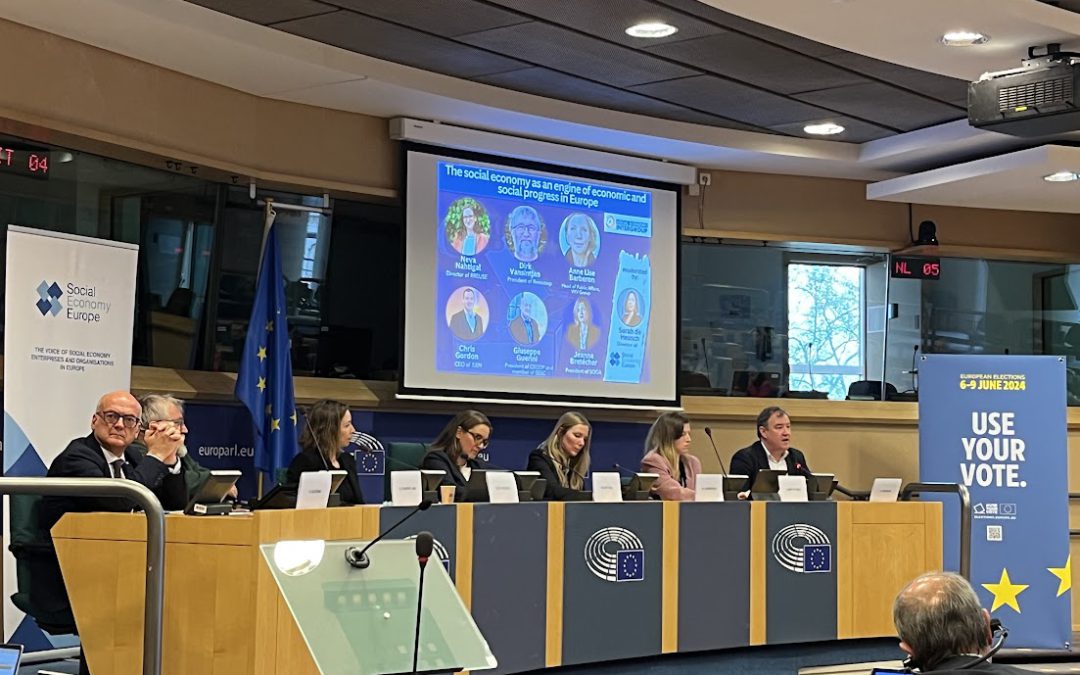The last Social Economy Intergroup meeting of the EU legislature was a great success with more than 100 attendees registered in person. Entitled The Social Economy in the EU elections 2024, it took place yesterday, April 16 at the European Parliament. The meeting, which was also followed online, was an important milestone for social economy for the upcoming EU elections in June. SEE could share its manifesto points: the renewal of the Social Economy Intergroup, the appointment of an EU Commissioner for Social Economy and the pursuing of the implementation of the Social Economy Action Plan.

The meeting could count on the intervention of high-level representatives and key figures for SE. First, the intervention of the European Commission Nicolas Schmit as driver of the Social Economy Action Plan who stated: “I am proud that our actions have given impetus to this business model”. But also 3 representatives of member states that strongly support SE: Spanish government with Minister Yolanda Díaz who led the UN Resolution on Social and Solidarity Economy and who greatly supported Social Economy during the recent Spanish Presidency of the EU Council; the Belgian government with Minister Christie Morreale who represented the current Presidency of the EU Council which promoted the recently signed Liège Roadmap, as well as the Polish government with Deputy Minister Katarzyna Nowakowska, the next country in line for presidency of the EU Council that explicitly supports social policies, and particularly SE.
The meeting was an opportunity to present the perspective of several social economy actors working in diverse sectors of activities who explained the unique contribution of social economy to many crucial challenges that the EU is facing. They explained how social economy provides solutions in the fields of Green transition (Neva Nathigal, RREUSE), Energy (Dirk Vansintjan, Rescoop), Housing (Anne Lise Barberon, Groupe VYV), Inclusion of vulnerable groups (Chris Gordon, ISEN), Employment (Giuseppe Guerini, CECOP) and Digitalization (Jeanne Bretécher, SOGA).
Though many groups have mentioned to SEE their support to the renewal of the SEIG, and that all were invited to participate in the event, the second roundtable welcomed members of the current SE intergroup (SEIG) of the EU Parliament representing 3 political groups. Their contributions stressed their support to SE for different reasons. From the S&D side, the SEIG counted on Brando Benifei and Patrizia Toia who, as Co-chair of the SEIG and host of the event, intervened in the opening. She stated: “The social economy is a driving force in Europe and has demonstrated this throughout this legislature”. From the Renew side, we counted on the intervention of Monica Semedo (Co-chair of the SEIG) in the 2nd round table and Jordi Cañas (Vice-chair of the SEIG) in the closing of the event. He highlighted: “This legislature has been a success for the social economy.” From the Greens/EFA side, Claude Gruffat (Co-chair of the SEIG) participated in the 2nd round table to support the renewal of the SEIG by highlighting the achievements so far and the necessity to continue supporting the ecosystem.
SEE President, Juan Antonio Pedreño, closed the event with enthusiasm. In addition to recalling the main points included in SEE memorandum for the EU elections, he thanked the work of the members of the SEIG. He also recalled the importance of keeping the connection between SE actors and key institutions such as the Commitee of Regions, the European Economic and Social Committee (through key work of Social Economy actors in group III) and the European Commission. But most of all, none of this could be possible without the people, enterprises and organizations that are part of and build the Social Economy ecosystem every day.




